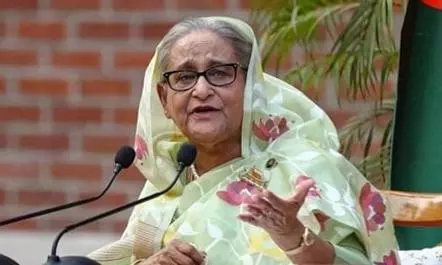
- Home
- India
- World
- Premium
- THE FEDERAL SPECIAL
- Analysis
- States
- Perspective
- Videos
- Sports
- Education
- Entertainment
- Elections
- Features
- Health
- Business
- Series
- In memoriam: Sheikh Mujibur Rahman
- Bishnoi's Men
- NEET TANGLE
- Economy Series
- Earth Day
- Kashmir’s Frozen Turbulence
- India@75
- The legend of Ramjanmabhoomi
- Liberalisation@30
- How to tame a dragon
- Celebrating biodiversity
- Farm Matters
- 50 days of solitude
- Bringing Migrants Home
- Budget 2020
- Jharkhand Votes
- The Federal Investigates
- The Federal Impact
- Vanishing Sand
- Gandhi @ 150
- Andhra Today
- Field report
- Operation Gulmarg
- Pandemic @1 Mn in India
- The Federal Year-End
- The Zero Year
- Science
- Brand studio
- Newsletter
- Elections 2024
- Events
- Home
- IndiaIndia
- World
- Analysis
- StatesStates
- PerspectivePerspective
- VideosVideos
- Sports
- Education
- Entertainment
- ElectionsElections
- Features
- Health
- BusinessBusiness
- Premium
- Loading...
Premium - Events

Before specific criminal responsibility is assigned—especially to a political leader with a long public career—a credible and independent probe is essential
I watched the verdict against Sheikh Hasina as it was streamed live from Dhaka. The full verdict is yet to be released, but what was read out was enough to produce a sinking sense of déjà vu. It felt like a theatre of justice rather than justicing.
The 1973 statute reflecting international criminal law (ICL) was forced into a script for which the stage was never prepared. And the Tribunal, reconstructed under the interim Yunus administration, whose constitutional basis remains widely contested, delivered its first judgement in a manner that will trouble anyone familiar with the doctrinal discipline of ICL.
Engineered justice apparatus
From the outset, the trial bore the marks of design. Judges who had never authored a single judgement in international crimes were first placed in the High Court Division on an interim basis and then drawn into the Tribunal almost immediately. Their sudden confirmation, only days before the verdict, created the unavoidable perception of executive temptation defying judges’ integrity conventions.
Also read | Hasina verdict leaves Awami League with two options: Irrelevance or reinvention
A body of law refined through long and painful global experience was handed to a bench learning it in real time while adjudicating the most momentous case in Bangladesh’s history. The conduct of the trial in absentia raised further concerns. International law permits such trials only in carefully defined situations: where the accused receives effective notice, voluntarily declines to appear, is meaningfully represented and is guaranteed a full retrial upon return. None of these safeguards were honoured. The state-appointed lawyer, often more theatrical than protective, had no contact with the accused.
The political climate made any real defence impossible. Absence cannot be deemed voluntary when the interim administration has created an atmosphere of fear, persecution and political cleansing that would deter any accused from returning.
Evidence falls alarmingly short
The evidentiary basis of the verdict, as read out, was alarmingly thin. Family accounts, bystander narratives, three “prosecution-verified” audio snippets, press briefings by the PM and the testimony of the police chief turned accomplice witness cannot meet the demanding threshold required for crimes against humanity (CAH). Abdullah Al Mamun’s deposition—secured through a promised pardon, uncorroborated and astonishingly presented as voluntary—sat uneasily with the most basic guarantees against self-incrimination (Article 35 of the Constitution).
More troubling was the Tribunal’s reliance on the Office of the High Commissioner Human Rights (OHCHR)’s interim fact-finding document. The OHCHR does not make criminal determinations, yet the Tribunal treated these extraneous remarks as if they carried legal weight. The prosecution’s own political ardour was laid bare in the courtroom itself, where clapping broke out as the death sentence was pronounced—an unsettling spectacle of penal populism that has long haunted Bangladesh’s criminal justice culture.
Legal reasoning falls apart
The legal reasoning of the judgement is its most troubling feature. The Tribunal’s application of Joint Criminal Enterprise (JCE) stretches the doctrine beyond recognition. Initial enthusiasm around JCE faded long ago, as scholarly doubts about its breadth now dominate debate. The doctrine suffers three flaws: it blurs the line between intent and knowledge, it extends liability to unforeseeable acts of others, and it treats all participants as equally culpable regardless of their actual role. In complex, multi-actor unrest such as that of July, these defects become acute.
Also read | Hasina’s death sentence pushes Bangladesh to brink of civil war
The killings in Rangpur, Chankharpul and Ashulia occurred under different circumstances, the latter after Sheikh Hasina had already left the country. To portray them as part of a single JCE is doctrinally unsound.
Equally misplaced was the Tribunal’s use of command responsibility. International law requires three strict elements: a real superior–subordinate relationship based on effective control, clear knowledge that crimes were being or about to be committed, and failure to take necessary steps to prevent or punish. None of these elements appears in the July events. Yet the Tribunal treated ambiguous political remarks and an audio call to the Dhaka University Vice-Chancellor and two political colleagues as if they were operational orders transmitted through a military chain of command.
This reverses the doctrine: civilian leaders incur liability only when they knowingly disregard specific information of impending crimes, not when they make heated political comments under chaotic conditions. The alleged remark to Vice-Chancellor ASM Moksud Kamal— “the way the rajakars were hanged, they will face the same fate”—was elevated into an order to kill protesters. Such an inference is astonishingly casual, especially when the incidents cited occurred in separate conditions, some after Hasina had left the country, and without evidence of her effective control.
Selective charges raise questions
A final question hovers over the entire prosecutorial design. Sheikh Hasina has been charged with six deaths in Chankharpul, four or five in Ashulia, and one in Rangpur. But many more people died across the country.
Who is responsible for those deaths? If the domestic criminal courts are competent to handle the other cases, why were only these three selected for the Tribunal? Does the prosecution believe that the remaining deaths did not occur under Hasina’s command? By choosing these three incidents as the entire canvas for crimes against humanity, the prosecution has effectively foreclosed the possibility of indicting her again for any other July event. For a case framed as a national tragedy of sweeping proportions, this selective attribution raises a doctrinal puzzle that the Tribunal seems to have left wholly unaddressed.
Even if one concedes that the July violence was ‘widespread,’ the threshold for crimes against humanity also requires proof that the attack was ‘systematic’—a question that remains deeply contested.
Imposing a death sentence for what was styled as crimes against humanity places the judgement far outside international practice. Let me be clear: the July atrocities require legal accountability. People died. Fires burned. Firearms were discharged. Arson, lynching, police excesses and counter-violence all took place. But these were layered events with participation from both state and non-state actors.
Before specific criminal responsibility is assigned—especially to a political leader with a long public career—a credible and independent investigation is essential with a flexible pre- and post-August 5 temporal mandate. That investigation must be impartial and internationally supervised, ideally under the United Nations, to ensure findings that are accurate and not political. Murder is one thing; assigning liability under the strict doctrines of international law is another.
A verdict undermining justice
The verdict, delivered with unusual haste under a government of disputed legality, has not inspired international confidence. Its doctrinal weaknesses are already under scrutiny. And its consequences extend beyond the courtroom. Bangladesh has asked India to extradite Sheikh Hasina. Yet India’s law bars extradition for political offences or where the accused faces a real risk of human rights violations.
Also read | Is India caught in Bangladesh storm with Sheikh Hasina's death sentence?
A verdict rendered in absentia without meaningful appellate possibilities deepens the impasse. India, long a partner of Bangladesh, now faces a delicate diplomatic calculus. To extradite would breach its legal duties; to refuse may strain bilateral ties. For now, international reactions have been cautious. The global community must urge Bangladesh to respect due process, honour constitutional governance and restore faith in the rule of law and an environment of an inclusive general election.
As I finished listening to the operative part of the judgement, I felt that the law itself had been placed on trial and found wanting. The Tribunal’s first judgement is likely to be remembered not for its conclusions but for the manner in which they were reached: hastily, aggressively and without fidelity to the doctrines it invoked.
International criminal law deserved a steadier hand. Bangladesh deserved a more principled process. And justice deserved far more than what was read aloud in that Dhaka courtroom.
(The Federal seeks to present views and opinions from all sides of the spectrum. The information, ideas or opinions in the articles are of the author and do not necessarily reflect the views of The Federal.)


